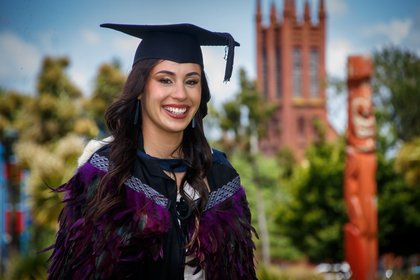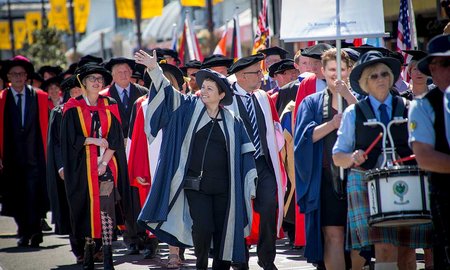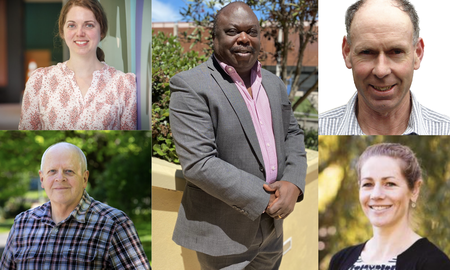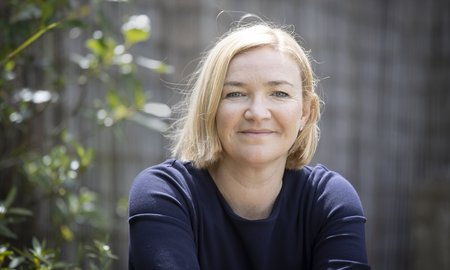
The 21-year-old graduated this week in Manawatū with a Bachelor of Arts (BA) in Mātauranga Māori (Māori Knowledge).
“Within the current BA degree and the compulsory papers that are part of it, I found it essentially hard to write in English what I could articulate in te reo Māori more effectively,” Suraya explains.
So she decided to ask her lecturer if she could write the assignments in te reo.
“I was pleasantly surprised at how positive and encouraging the response was, only because it wasn't common knowledge that you could write assignments in te reo Māori. I should've known it was possible, considering it is an official language here in Aotearoa, right?”
Completing her first assignment in te reo gave Suraya a sense of humility and achievement for upholding the mana of te reo.
“I then set myself the challenge that I wanted to carry this on and complete the whole degree in te reo Māori.”
Suraya, who was born in Feilding but grew up in Kimbolton and Palmerston North, first began to learn te reo when she was in the bilingual unit at Monrad Intermediate (now known as Te Kura Waenga o Tirohanga) and was fluent by the time she finished high school at MANUKURA.
Completing her degree in te reo was particularly significant for Suraya as she descends from generations where te reo Māori has been lost within her whānau.
“My motivation was to re-instil this taonga within my whānau with the hopes of breaking intergenerational cycles that pave the way for future generations to come,” Suraya says.
“However the inspiration also relates to my passions for mātauranga Māori, te reo Māori me ōna tikanga [Māori language and culture] and upholding their mana. The time is now for my generation to step in to a te ao Māori worldview using our education to bring the legacies and teachings of our tīpuna [ancestors], merging their kawa [protocols] and whakaaro tawhito [ancient thoughts] with contemporary learning.
“My inspiration continues by acknowledging and showing respect to our tīpuna by fulfilling their dreams for us to have the opportunities to utilise te reo Māori and mātauranga Māori in today's society.”
While there has been a growing number of uses for te reo in tertiary education over the past 20 years, it is still a work in progress. This meant there were a few things that needed to be put in place for Suraya, such as finding people to mark or peer review her papers and discussions with lecturers.
“Despite how proud and lucky I felt to write in te reo Māori, it also came with challenges and the processes can be quite complex, depending on the course,” Suraya explains.
“Although not once did any of the markers and lecturers complain or discourage this, I was very aware that this was added work on top of the mahi they already undertook, so I was always extremely grateful.”
Suraya is eager to share her story so current and future students know that there is the opportunity to write in te reo at university. She is continuing her studies through a Master of Arts degree, which will research how we can enhance and enrich the use of te reo in tertiary education.
“It's important that we push ourselves to advance the disciplines and identify ways we can offer support for tauira to make these processes easier and to develop their knowledge. It's also important that our reo and our mātauranga are recognised, upheld, heard and seen across tertiary education.”
With so many people supporting her to make her degree possible, Suraya gives her utmost thanks to her pouako (teachers), past and present, particularly Te Rā Moriarty, Darryn Joseph, Margaret Forster, Hona Black and Felicity Ware from Te Pūtahi-a-Toi – School of Māori Knowledge.
“I'm extremely privileged to have been and continue to be in the presence of such honourable reo Māori speaking champions and philosophical people,” she says.
“Mokori anō kia rere ngā mihi ki a koutou e ngā kākā tarahae me ō koutou pūkenga, pūmanawa, e whawhao ana i te hirikapo o ngā tauira otirā, ngā kuaka mārangaranga o te ao mātauranga.”
Suraya also extends her acknowledgment to her parents, brothers, sister and extended whānau for their love and support.
“They have always stood by my side, encouraged and supported me in my endeavours and I truly wouldn’t be who I am or where I am without them.”
Interested in studying at Massey next year? Apply now.
More news
Palmerston North celebrates 2022 graduates
More than 1100 students will cross the stage at The Regent this week at graduation ceremonies in Palmerston North.

2022 Professorial promotions announced
In the most recent promotion round, 21 staff were promoted to Professor and 31 to Associate Professor. The promotions will take effect from 1 January 2023.

Sharing innovation and creation at Fieldays® 2022
We are once again partnering with Fieldays in 2022, showcasing our latest innovations in the food science, horticulture and agriculture spheres.

Postfeminism and Body Image - looking beautiful while making a nice smoothie
Professor Sarah Riley is the co-author of newly published book that explores the intersection of postfeminism and health studies.
